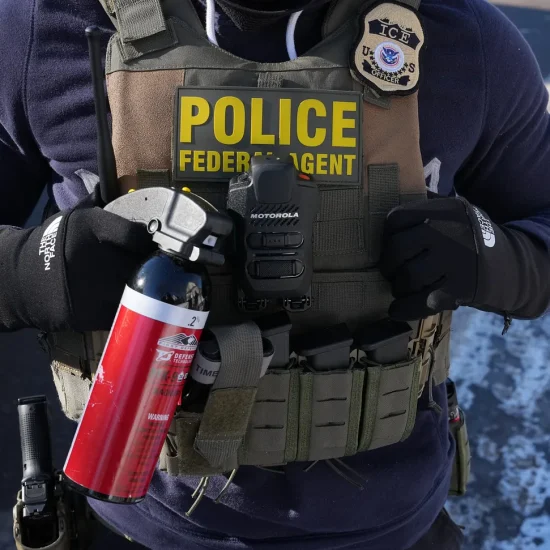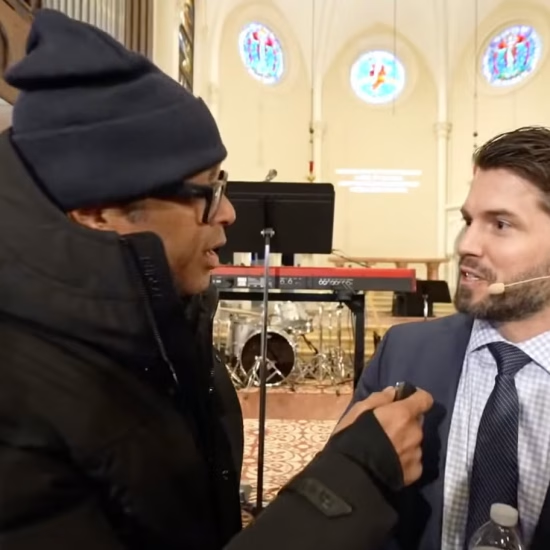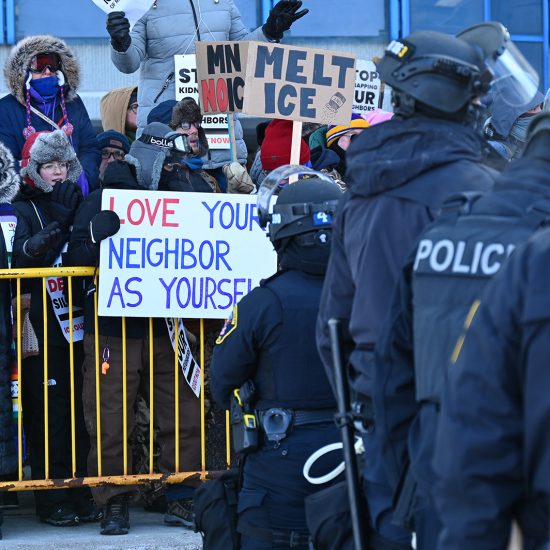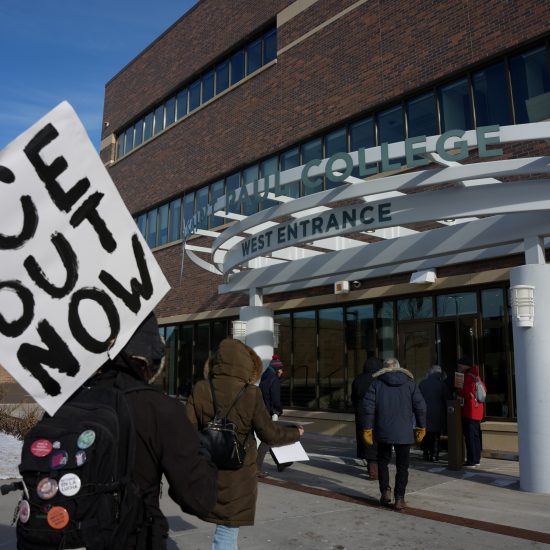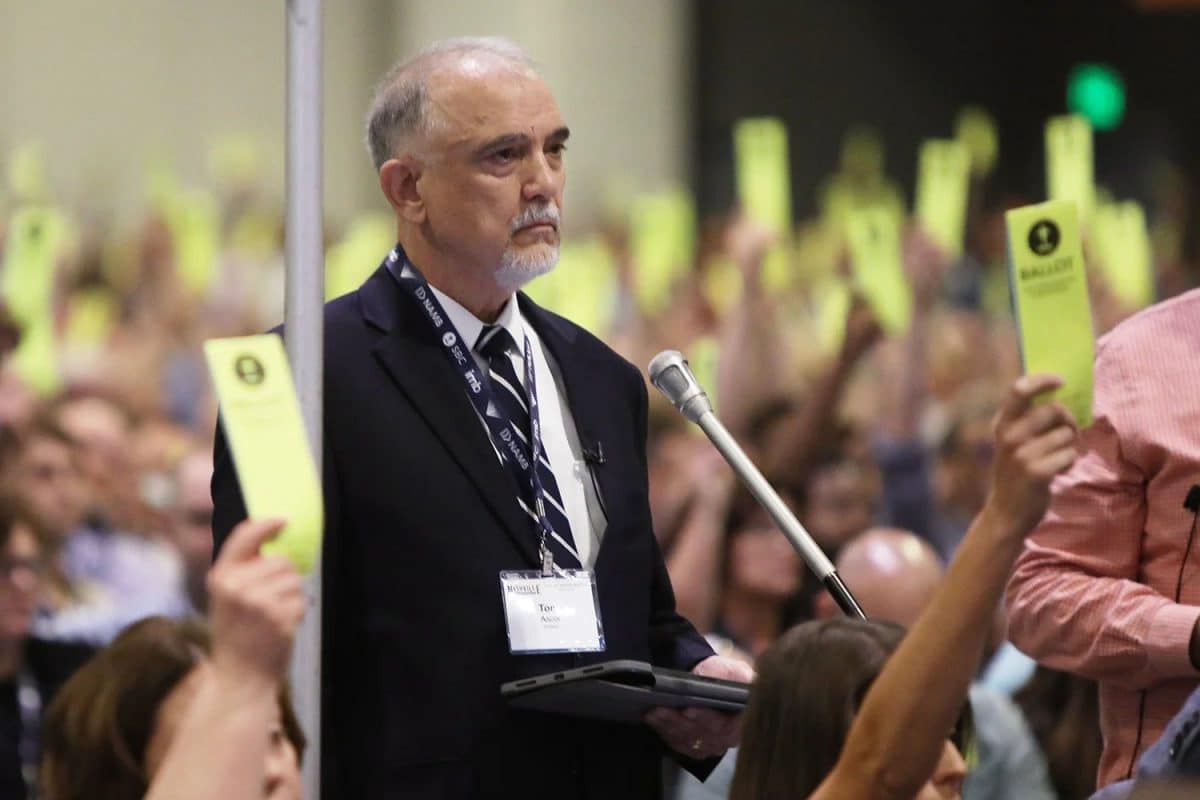
(RNS) — When he first felt called to be a pastor, Tom Ascol thought God was playing a joke on him. Ascol grew up in a troubled family in a house owned by a Texas church where his dad was a deacon and Sunday school teacher. When the family couldn’t pay the rent, a pastor tried to kick them out until a deacon intervened.
The experience left him bitter toward pastors. Complicating his view of church, his dad led what amounted to a double life: one as a respected church leader and another as “a drunk and a womanizer and an abuser,” Ascol told Baptist Press, the official Southern Baptist news service, in a recent interview.
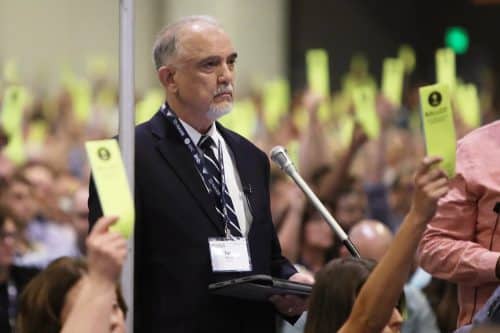
Tom Ascol waits near a mic during the SBC annual meeting in Nashville, Tennessee, on June 15, 2021. (Kit Doyle/Religion News Service)
“We’re Baptists, and you know, my dad had no business being a church member, much less a deacon and a Sunday school teacher,” he said. “That created a lot of angst. Not just in me, but in the community.”
Once he accepted his own call, Ascol decided he did not want to be an ordinary pastor. Instead, he wanted to do things by the book, the way the Bible said things should be done.
That approach to ministry has stuck with Ascol, pastor of Grace Baptist Church in Cape Coral, Florida, and leading candidate for president of the Southern Baptist Convention. The theme of his candidacy can be summed up in four words: “We have a book.”
But Ascol’s focus on the Bible has led him to become a vocal critic of the SBC in recent years. Liberalism, critical race theory, and women preachers are leading the denomination away from Scripture, he believes. Ascol has long argued that Southern Baptists have been too eager to embrace pragmatic ideas on how to attract people to church and have been too accommodating to the broader culture.
In a recent essay for Founders Ministries, a Florida nonprofit that Ascol heads, he argued that Southern Baptists are “embarrassed of the teachings of the Scripture.” His complaints arise from Southern Baptists who have urged the denomination to come to terms with its history, welcoming ideas drawn from academia about racism’s pervasiveness in society. Resolution 9, passed at the SBC’s 2019 annual meeting, referred to “critical race theory and intersectionality” as useful analytics tools. Ascol views the resolution as an intolerable distraction from biblical truth.
“Brothers and sisters, it should not be this way,” he wrote in his Founders Ministries essay. “The word of God is sharper than any two-edged sword and will not return void. But if we muzzle ourselves out of a misplaced desire to placate the culture, how can we expect the Word to have that effect?”
Resolution 9 and Ascol’s concerns about the liberal drift of the SBC are the subject of a documentary from Founders Ministries called “By What Standard,” which includes footage from the 2019 SBC meeting. The film’s trailer begins with Ascol saying, “We’ve been played.”
The film also captures part of a conversation between Ascol and Georgia Baptist pastor Josh Buice, in which they say that asking women to take a role in the church that “God did not intend” is abusive. Ascol has also argued that churches that have women preach during worship services have no place in the SBC.
Much of Ascol’s support comes from the so-called SBC pirates, a coalition of SBC-related groups that claim the denomination has drifted away from the Bible toward liberalism. Those groups include Founders Ministries, which promotes Calvinist beliefs; a Christian nationalist group called Sovereign Nations — founded by a cruise organizer who works closely with atheist hoaxer James Lindsay; and the Conservative Baptist Network, founded by allies of disgraced SBC legend Paige Patterson. Those groups all share concerns about CRT, social justice, and conservative politics — Ascol himself has done interviews with a series of Trump-friendly podcasts and media outlets in the run-up to the election.
His positions, he says, are driven by a concern about the health of local SBC churches. In an interview last year, Ascol told Religion News Service that pragmatism has resulted in Southern Baptist churches being filled with people who think they are Christians but who really are not. It’s an alarm he has been sounding for decades, calling the SBC’s membership statistics a “sham” because so few church members actually show up in church.
While Southern Baptist churches claim 13.7 million members, actual attendance at church services — both in person and online — was closer to 5 million people in 2021. Ascol sees the discrepancy as a sign that Southern Baptists no longer practice “regenerate church membership” — the idea that only true believers who have been born again, been baptized and are active in the church, should be counted as members.
In 2008, he supported a resolution about regenerate church membership passed at the SBC annual meeting that called on churches to maintain accurate membership rolls and to discipline wayward members. Ascol told the Conservative Baptist Network in a recent interview that more work is needed in this area for the SBC to be healthy.
“I think if we were to practice regenerate church membership and church discipline more carefully than we have, our churches would look more like what the New Testament calls churches to be, and the message that we preach would be more commended by the way that we live,” he said.
If elected, Ascol would be the first SBC president in decades who is not a megachurch pastor: Grace Baptist has 224 members and an average worship attendance of 280 people, according to data from the congregation’s SBC profile.
He believes in the primacy of the local church in the polity of the SBC: It’s a message he stressed at a forum for SBC presidential candidates, saying that churches, rather than the convention, should lead any response to sexual abuse.
“It is hard, but it’s not complicated,” he said. “And we just need the faith and the humility to look to the Word of God and say, ‘this is what God tells us to do. We’re going to do it and we’re going to leave costs and consequences to him.’ And I believe if we were to do that, we would find ourselves caring very well, much better than we have in the past.”

